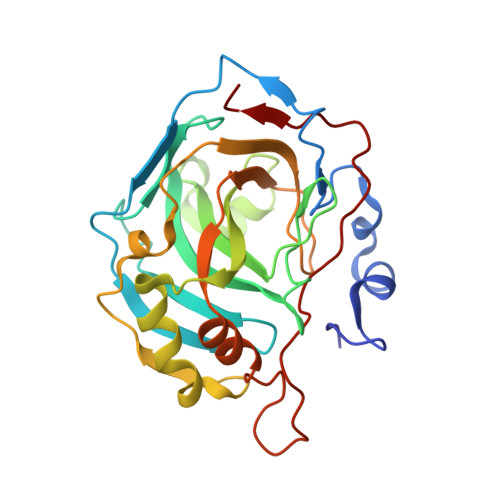Discovery and characterization of novel selective inhibitors of carbonic anhydrase IX.
Dudutiene, V., Matuliene, J., Smirnov, A., Timm, D.D., Zubriene, A., Baranauskiene, L., Morkunaite, V., Smirnoviene, J., Michailoviene, V., Juozapaitiene, V., Mickeviciute, A., Kazokaite, J., Baksyte, S., Kasiliauskaite, A., Jachno, J., Revuckiene, J., Kisonaite, M., Pilipuityte, V., Ivanauskaite, E., Milinaviciute, G., Smirnovas, V., Petrikaite, V., Kairys, V., Petrauskas, V., Norvaisas, P., Linge, D., Gibieza, P., Capkauskaite, E., Zaksauskas, A., Kazlauskas, E., Manakova, E., Grazulis, S., Ladbury, J.E., Matulis, D.(2014) J Med Chem 57: 9435-9446
- PubMed: 25358084
- DOI: https://doi.org/10.1021/jm501003k
- Primary Citation of Related Structures:
4PYX, 4PYY, 4PZH, 4Q06, 4Q07, 4Q08, 4Q09, 4Q0L - PubMed Abstract:
Human carbonic anhydrase IX (CA IX) is highly expressed in tumor tissues, and its selective inhibition provides a potential target for the treatment of numerous cancers. Development of potent, highly selective inhibitors against this target remains an unmet need in anticancer therapeutics. A series of fluorinated benzenesulfonamides with substituents on the benzene ring was designed and synthesized. Several of these exhibited a highly potent and selective inhibition profile against CA IX. Three fluorine atoms significantly increased the affinity by withdrawing electrons and lowering the pKa of the benzenesulfonamide group. The bulky ortho substituents, such as cyclooctyl or even cyclododecyl groups, fit into the hydrophobic pocket in the active site of CA IX but not CA II, as shown by the compound's co-crystal structure with chimeric CA IX. The strongest inhibitor of recombinant human CA IX's catalytic domain in human cells achieved an affinity of 50 pM. However, the high affinity diminished the selectivity. The most selective compound for CA IX exhibited 10 nM affinity. The compound that showed the best balance between affinity and selectivity bound with 1 nM affinity. The inhibitors described in this work provide the basis for novel anticancer therapeutics targeting CA IX.
Organizational Affiliation:
Department of Biothermodynamics and Drug Design, Institute of Biotechnology, ‡Department of Bioinformatics, Institute of Biotechnology, §Department of Protein-DNA Interactions, Institute of Biotechnology, Vilnius University , V. A. Graičiu̅no 8, Vilnius LT-02241, Lithuania.


















